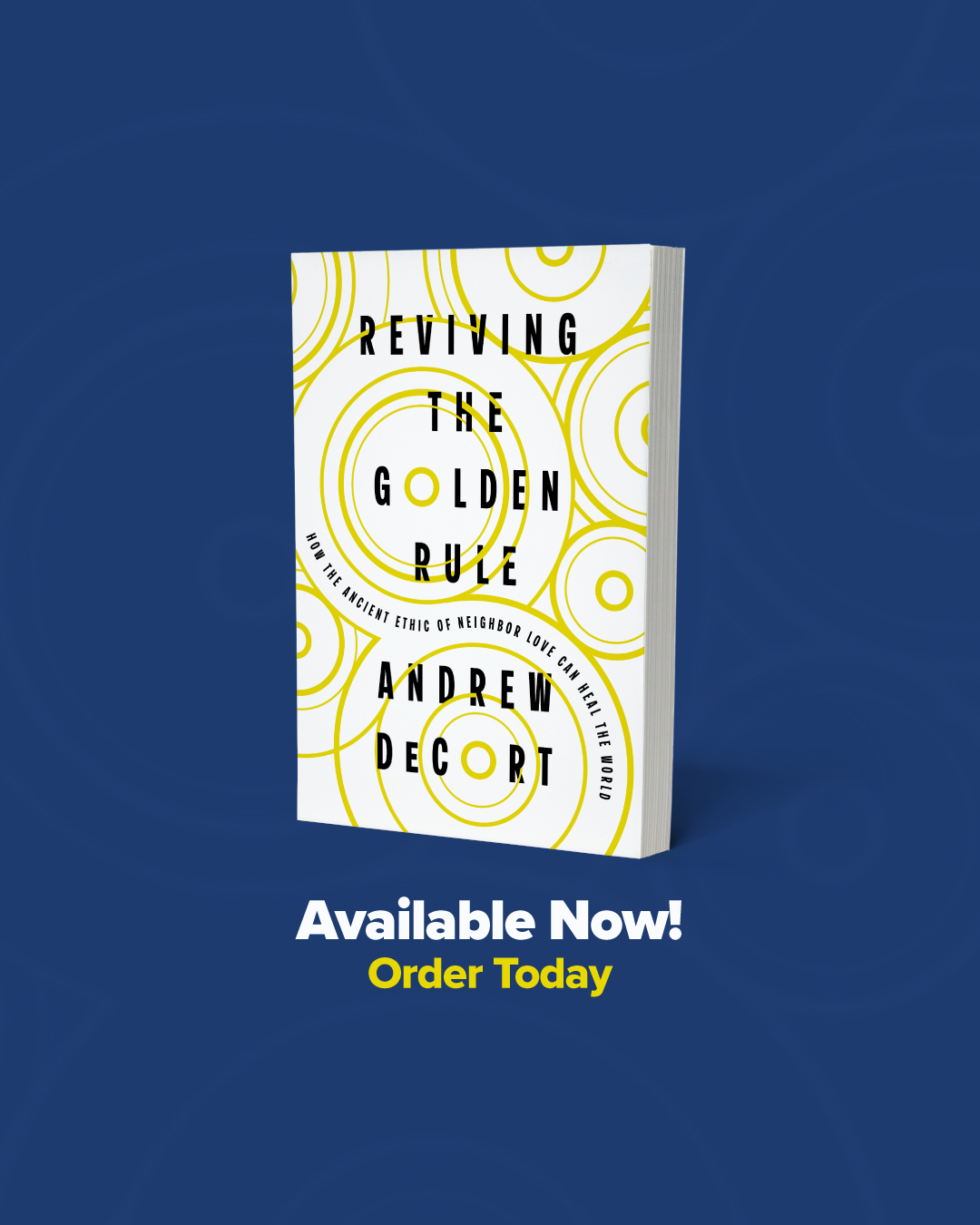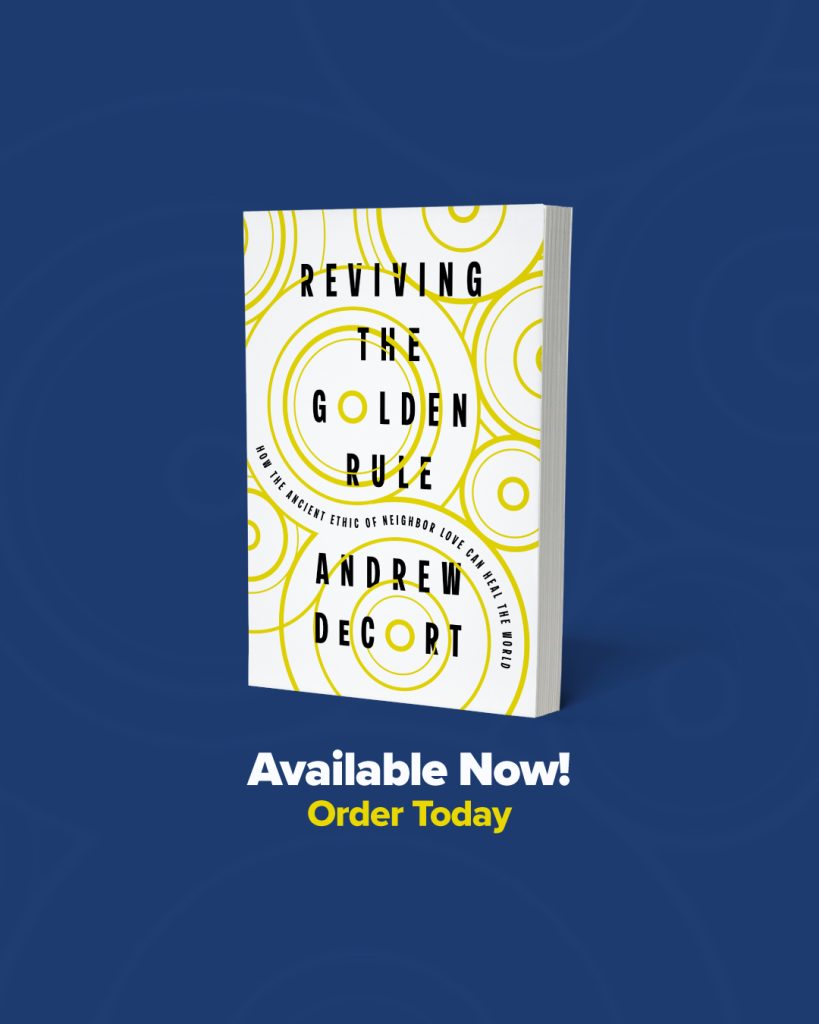Dear friends,
Today is a special milestone in my journey. My new book Reviving the Golden Rule: How the Ancient Ethic of Neighbor Love Can Heal the World is out now! It’s available in paperback, ebook, and audiobook (narrated by your truly) on Amazon, BookShop, and wherever you buy books.
Happily, today is also the birthday of Mahatma Gandhi and the International Day of Nonviolence. Gandhi meditated daily on Jesus’ teaching about loving our neighbors and called Jesus’ way “nonviolence par excellence.”

Why It Matters
A recent statement reminded me of why this book matters to me so much. It also illustrates why I believe reviving the ethic of neighbor love is so important today.
Donald Trump was speaking at the memorial for Charlie Kirk on September 21st. An audience of around 100,000 people was gathered in the wake of Kirk’s horrific killing. Of course, Trump knew that the world would also be listening.
To this national and global audience, the American president declared, “I hate my opponents and I don’t want what’s best for them.” In saying this, he addressed Kirk’s widow, Erika, and directly contradicted her moving statement moments before. Erika Kirk had said that she has chosen to forgive her husband’s killer because, “The answer to hate is not hate. The answer we know from the Gospel is love and always love – love for our enemies and love for those who persecute us.”
With his statement, Trump distilled the spirit that has dominated much of human history: seeing others as enemies and not desiring their wellbeing. This othering attitude was woven throughout our ancient mythologies, philosophies, and cultures. It created societies driven by status and power that normalized inequality and oppression.
Sadly, othering is being normalized again today at the highest levels of power. Even leaders who claim to champion Christian values are normalizing othering – this de-neighboring, us-versus-them mindset. Indeed, openly declaring hatred for others is no longer seen as a risk for losing popular support. This is even the case when hate is declared in contradiction to a bereaved widow’s defiant love.
The Stakes Today
At the start of his public movement, Jesus confronted this popular (im)morality head on. He told his listeners, “You have heard that it was said, ‘Love your neighbor and hate your enemy.’” That was the default ethic, even in Jesus’ own religious community. To this, Jesus declared, “But I tell you, love your enemies” (Matthew 5:43). With these words, Jesus cut the root of othering and called for a universal love of all neighbors.
In 1949, Howard Thurman, spiritual mentor to Martin Luther King Jr., named what’s at stake in Jesus’ groundbreaking summons to resist the us-versus-them ethic and to love even our enemies: “Jesus rejected hatred because he saw that hatred meant death to the mind, death to the spirit, death to communion with his Father.” Dr. King echoed Jesus and Thurman like this: “we must love our enemies [because] hate scars the soul and distorts the personality… Hate destroys a man’s sense of values.”
Bittersweetly, the moral imperative to love all people as our neighbors, including our “enemies,” is no longer obvious today. This ethic can’t be taken for granted and is increasingly countercultural, even in some Christian circles. (Kirk’s memorial service was ostensibly a “Christian” event with prayer and worship. And still, much of the audience laughed loudly when Trump said, “I hate my opponents, and I don’t want good for them.”) We’re sliding back into the old ethic in which “neighbors” primarily mean “our people” and “others” can be insulted, excluded, or attacked.
An Invitation to Revive the Golden Rule
Today we need a fresh immersion in the ethic of loving others as our neighbors. When we dive deeply into it, we find not an abstract principle but an unfolding story and expanding movement alive with hope and healing.
In this ethical vision, “neighbor” isn’t a geographical term of physical proximity or group identity. It’s a moral term that names seeing and treating other people as morally connected to us and equally precious in value. In each generation, the invitation resounds from this movement: to recognize more and more “others” as our neighbors and to heal the blindness of othering.
I wrote Reviving the Golden Rule to offer precisely this re-immersion in the ethics of loving our neighbors as ourselves. The book explores the origins of neighbor love in the Bible, its unfolding story across history, and the implications of this movement for us today. I intentionally organized it into short sections with accessible language so readers can feel at home in the book.
Imagine today if our culture-making leaders declared – and, hopefully, practiced – this moral vision: “It’s difficult, but I strive to love my opponents, and I want what’s best for them.” More minimally, imagine a society and Christian community in which declaring hatred and ill will toward other people isn’t a cause for laughter but for sorrow, alarm, and resistance. There’s no magic fix to our othering today. But the moral vision of seeing others as our neighbors would open up so much good ground. In it would grow more trust, communication, cooperation, and compromise for the common good, especially when disagreement still persists.
Where Love Can Flourish
I long for a society that cultivates and dares to expect this quality of character, especially among its leaders. And I long for Christian communities where this vital, vibrant way of being human is being cultivated and rippling out into the wider world. As bell hooks wrote so eloquently, “We want to live in a culture where love can flourish. We yearn to end the lovelessness that is so pervasive in our society… Only love can heal the wounds of the past.”
If you share this longing, I hope you’ll order Reviving the Golden Rule on Amazon, BookShop, or wherever you buy books today. If you want to help spread the word about this healing vision, any of these steps would be much appreciated:
- Leave a star rating and review on Amazon and/or GoodReads. (Please only review it on Amazon if you purchased the book there. Unverified reviews can shutdown the page.)
- Post about it on social media.
- Mention it in a newsletter.
- Suggest it for a book club, class, or library.
- Invite me to share about it with your community,
Thank you for sharing this special day with me. Together, may we do our part to revive the golden rule in our time. Across centuries and cultures, Jesus’ promise echoes, “Do this and you will flourish” (Luke 10:28).
Yours with love and gratitude,
Andrew





